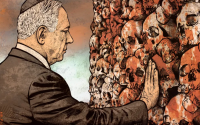The Nation, 8 October, 2001
America and Americans on September 11 experienced the full horror of what must surely be the greatest display of grotesque cunning in human history. Its essence consisted in transforming the benign, everyday technology of commercial jet aircraft into weapons of mass destruction. There has been much talk about Americans discovering the vulnerability of their heartland in a manner that far exceeds the collective trauma associated with the attack on Pearl Harbor. But the new vulnerability is radically different and far more threatening. It involves the comprehensive vulnerability of technology closely tied to our global dominance, pervading every aspect of our existence. To protect ourselves against the range of threats that could be mounted by those of fanatical persuasion is a mission impossible. The very attempt would quickly turn the United States into a prison-state.
And yet who can blame the government for doing what it can in the coming months to reassure a frightened citizenry? Likely steps seem designed to make it more difficult to repeat the operations that produced the WTC/Pentagon tragedy, but it seems highly unlikely that a terrorist machine intelligent enough to pull off this gruesome operation would suddenly become so stupid as to attempt the same thing soon.
The atrocity of September 11 must be understood as the work of dark genius, a penetrating tactical insight that endangers our future in fundamental respects that we are only beginning to apprehend. This breakthrough in terrorist tactics occurred in three mutually reinforcing dimensions: (1) the shift from extremely violent acts designed to shock more than to kill, to onslaughts designed to make the enemy's society into a bloody battlefield, in this instance symbolically (capitalism and militarism) and substantively (massive human carnage and economic dislocation); (2) the use of primitive capabilities by the perpetrators to appropriate technology that can be transformed into weaponry of mass destruction through the mere act of seizure and destruction; (3) the availability of competent militants willing to carry out such crimes against humanity at the certain cost of their own lives. Such a lethal, and essentially novel, combination of elements poses an unprecedented challenge to civic order and democratic liberties. It is truly a declaration of war from the lower depths.
It is important to appreciate this transformative shift in the nature of the terrorist challenge both conceptually and tactically. Without comprehending these shifts, it will not be possible to fashion a response that is either effective or legitimate, and we need both. It remains obscure on the terrorist side whether a strategic goal accompanies this tactical escalation. At present it appears that the tactical brilliance of the operation will soon be widely regarded as a strategic blunder of colossal proportions. It would seem that the main beneficiaries of the attack in the near future are also the principal enemies of the perpetrators. Both the United States globally and Israel regionally emerge from this disaster with greatly strengthened geopolitical hands. Did the sense of hatred and fanaticism of the tactical masterminds induce this seeming strategic blindness? There is no indication that the forces behind the attack were acting on any basis beyond their extraordinary destructive intent.
And so we are led to the pivotal questions: What kind of war? What kind of response? It is, above all, a war without military solutions. Indeed it is a war in which the pursuit of the traditional military goal of "victory" is almost certain to intensify the challenge and spread the violence. Such an assessment does not question the propriety of the effort to identify and punish the perpetrators and to cut their links to government power. In our criticism of the current war fever being nurtured by an unholy alliance of government and media we should not forget that the attacks were massive crimes against humanity in a technical legal sense, and those involved in carrying them out should be punished to the fullest extent. Acknowledging this legitimate right of response is by no means equivalent to an endorsement of unlimited force. Indeed, an overreaction may be what the terrorists were seeking to provoke so as to mobilize popular resentment against the United States on a global scale. We need to act effectively, but within a framework of moral and legal restraints.
First of all, there should be the elementary due process of convincingly identifying the perpetrators and their backers. Second, maximum effort should be made to obtain authorization for any use of force in a specific form through the procedures of the United Nations Security Council. Unlike the Gulf War model, the collective character of the undertaking should be integral at the operational level, and not serve merely as window dressing for unilateralism. Third, any use of force should be consistent with international law and with the "just war" tradition governing the use of force--that is, it should discriminate between military and civilian targets, be proportionate to the challenge and be necessary to achieve a military objective, avoiding superfluous suffering. If retaliatory action fails to abide by these guidelines, with due allowance for flexibility depending on the circumstances, then it will be seen by most as replicating the fundamental evil of terrorism. It will be seen as violence directed against those who are innocent and against civilian society. And fourth, the political and moral justifications for the use of force should be accompanied by the concerted and energetic protection of those who share an ethnic or religious identity with the targets of retaliatory violence.
Counseling such guidelines does not overcome a dilemma that is likely to grow more obvious as the days go by: Something must be done, but there is nothing to do. What should be done if no targets can be found that are consistent with the guidelines of law and morality? We must assume that the terrorist network anticipated retaliation even before the attack, and has taken whatever steps it can to "disappear" from the planet, to render itself invisible. The test, then, is whether our leaders have the forbearance to refrain from uses of forces that are directed toward those who are innocent in these circumstances, and whether our citizenry has the patience to indulge and accept such forbearance. It cannot be stressed too much that the only way to win this "war" (if war it is) against terrorism is by manifesting a respect for the innocence of civilian life and by reinforcing that respect with a credible commitment to the global promotion of social justice.
The Bush Administration came to Washington with a resolve to conduct a more unilateralist foreign policy that abandoned the sort of humanitarian pretense that led to significant American-led involvements in sub-Saharan Africa and the Balkans during the 1990s. The main idea seemed to be to move away from liberal geopolitics and to downsize the international US role by limiting overseas military action to the domain of strategic interests, and to uphold such interests by a primary reliance on America's independent capabilities. Behind such thinking was the view that the United States does not need the kind of help that it required during the cold war, and at the same time that it should not shoulder the humanitarian burdens of concern for matters that are remote from its direct interests. Combined with the Administration's enthusiasm for missile defense and weapons in space, such a repositioning of foreign policy was supposed to be an adjustment to the new realities of the post-cold war world. Contrary to many commentaries, such a repositioning was not an embrace of isolationism, but was a revised version of internationalism based on a blend of unilateralism and militarism. In the early months of the Bush presidency this altered foreign policy was mainly expressed by repudiating a series of important, widely supported multilateral treaty frameworks, including the Kyoto Protocol dealing with global warming, the ABM treaty dealing with the militarization of space and the Biological Weapons Convention dealing with implementing the prohibition on developing biological weaponry. Allies of the United States were stunned by such actions, which seemed to reject the need for international cooperation to address global problems of a deeply threatening nature.  And then came September 11, and an immediate realization in Washington that the overwhelming priority of its foreign policy now rests upon soliciting precisely the sort of cooperative international framework it worked so hard to throw into the nearest garbage bin. Only time will tell whether such a realization goes deeper than a mobilization of support for global war. Unlike the Gulf War and the Kosovo War, which were rapidly carried to their completion by military means, a struggle against global terrorism even in its narrowest sense would require the most intense forms of intergovernmental cooperation ever experienced in the history of international relations. The diplomacy needed to receive this cooperation might set some useful restraints on the current US impulse to use force excessively and irresponsibly.
And then came September 11, and an immediate realization in Washington that the overwhelming priority of its foreign policy now rests upon soliciting precisely the sort of cooperative international framework it worked so hard to throw into the nearest garbage bin. Only time will tell whether such a realization goes deeper than a mobilization of support for global war. Unlike the Gulf War and the Kosovo War, which were rapidly carried to their completion by military means, a struggle against global terrorism even in its narrowest sense would require the most intense forms of intergovernmental cooperation ever experienced in the history of international relations. The diplomacy needed to receive this cooperation might set some useful restraints on the current US impulse to use force excessively and irresponsibly.
A root question underlying the US response is the manner in which it deals with the United Nations. There is reportedly a debate within the Bush Administration between those hardliners who believe that the United States should claim control over the response by invoking the international-law doctrine of "the inherent right of self-defense" and those more diplomatically inclined, who favor seeking a mandate from the Security Council to act in collective self-defense. Among the initiatives being discussed in the search for meaningful responses is the establishment through UN authority of a special tribunal entrusted with the prosecution of those indicted for the crime of international terrorism, possibly commencing with the apprehension and trial of Osama bin Laden. Such reliance on the rule of law would be a major step in seeking to make the struggle against terrorism enjoy the genuine support of the entire organized international community.
It must be understood that the huge challenge posed by the attacks can be met effectively only by establishing the greatest possible distance between the perpetrators and those who are acting on behalf of their victims. And what is the content of this distance? An unconditional respect for the sacredness of life and the dignity of the individual. One of the undoubted difficulties in the weeks and months ahead will be to assuage the bloodthirst that has accompanied the mobilization for war while satisfying the rest of the world that the United States is acting in a manner that displays respect for civilian innocence and human solidarity. A slightly related challenge, but with deeper implications, is the need to avoid seeming to exempt state violence from moral and legal limitations, while insisting that such limitations apply to the violence of the terrorists. Such a double standard will damage the indispensable effort to draw a credible distinction between the criminality of the attack and the legitimacy of the retaliation.
There are contradictory ways to address the atrocities of September 11. The prevailing mood is to invoke the metaphor of cancer and to preach military surgery of a complex and globe-girdling character that must be elevated to the status of a world war, and that bears comparison with World Wars I and II; the alternative, which I believe is far more accurate as diagnosis and cure, is to rely on the metaphor of an iceberg. The attack on America was the tip of an iceberg, the submerged portions being the mass of humanity that is not sharing in the fruits of modernity, but finds itself under the heel of US economic, military, cultural and diplomatic power. To eliminate the visible tip of the iceberg of discontent and resentment may bring us a momentary catharsis, but it will at best create an illusion of victory. What must be done is to extend a commitment to the sacredness of life to the entire human family--in effect, joining in a collective effort to achieve what might be called "humane globalization."
The Israel/Palestine conflict, its concreteness and persistence, is part of this new global reality. All sides acknowledge its relevance, but the contradictory narratives deform our understanding in serious respects. Israel itself has seized the occasion to drop any pretense of sensitivity to international criticism or calls for restraint in its occupation of the Palestinian territories. Israeli spokespersons have been active in spreading the word that now America and the world should appreciate the adversaries Israel has faced for decades, and should learn from Israel's efforts to control and destroy its terrorist enemies. In contrast, those supporting Palestinian rights argue that the kinds of violence generated by Israeli oppression and Israel's refusal to uphold international law and human rights give rise to a politics of desperation that includes savage attacks on Israeli civilian society. They argue that giving a suppressed people the choice between terrorism and surrender is abusive, as well as dangerous.
On the deepest level, the high-tech dominance achieved by US power, so vividly expressed in the pride associated with "zero casualties" in the 1999 NATO war over Kosovo, is giving to the peoples of the world a similar kind of choice between poverty and subjugation, on the one hand, and vindictive violence, on the other.
Is our civil society robust enough to deliver a just response in some effective form? We cannot know, but we must try, especially if we value the benefits of discussion and debate as integral to the health of democracy. Such an imperative seems particularly urgent because of the vacuum at the top. There has been, in these terrible days of grieving for what has been lost, no indication of the sort of political, moral and spiritual imagination that might begin to help us better cope with this catastrophe. We should not fool ourselves by blaming George W. Bush or Republicans. The Democratic Party and its leaders have shown no willingness or capacity to think any differently about what has occurred and what to do about it. Mainstream TV has apparently seen its role as a war-mobilizing and patrioteering mechanism, with no interest in including alternative voices and interpretations. The same tired icons of the establishment have been awakened once more to do the journeyman work of constructing a national consensus in favor of all-out war, a recipe for spreading chaos around the world and bringing discredit to ourselves.
We are poised on the brink of a global, intercivilizational war without battlefields and borders, a war seemingly declared against the enigmatic and elusive, solitary figure of Osama bin Laden, stalking remote mountainous Afghanistan while masterminding a holy war against a mighty superpower. To the extent that this portrayal is accurate it underscores the collapse of a world order based on relations among sovereign territorial states. But it also suggests that the idea of national security in a world of states is obsolete, and that the only viable security is what is being called these days "human security." Yet the news has not reached Washington, or for that matter the other capitals of the world. Instead there is the conviction that missile defense shields, space weaponry and grand antiterrorist coalitions can keep the barbarians at bay. In fact, this conviction has turned into a frenzy in the aftermath of the attacks, giving us reason to fear the response almost as much as the initial, traumatizing provocations. As the sun sets on a world of states, its militarism appears ready to burn more brightly than ever.






